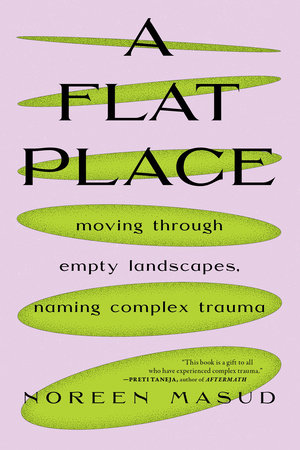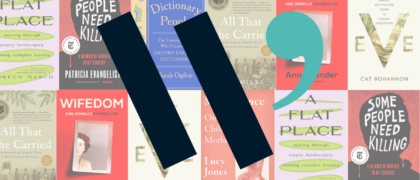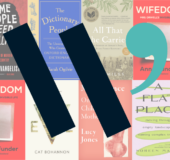Introduction Every morning in Lahore, as we drove to school, there came a point when I’d quieten and coil into myself. Jammed together with me in the back seat, my sisters went on quarrelling, poking one another with elbows, voices raised in jeers or protest. But I stared out of the window, holding myself taut as we passed the carpet seller, his rugs spread over the grass embankment on the side of the road and pinned up on the trees with long nails. My favourite moment of the day was coming, and I had to be ready.
If I wasn’t prepared – if a kick broke my concentration, or wrestling siblings knocked my head out of its line of sight – I’d miss the miracle. Because when we reached the end of that cramped road, our car dodging donkey carts and street sellers and dashing children, and turned the corner – in that instant, the world opened out. Lahore vanished around me. All I could see, stretching out for miles, were huge empty fields.
We’d crossed from city into fairy tale. And, every morning, no one noticed but me.
I’ve forgotten so much of my early life, but those fields have stayed with me. How could there be so much empty land in the middle of crowded, parched, shouting Lahore? How could anything be so deeply, achingly green? I felt that green on my skin and in my dry throat. The school playground never kept its grass more than a few days. Every year it was resown, optimistically, the seeds sending up dark dusty tufts, as though Lahore might decide to change its climate. But within days the ground had baked solid and brown, under the blasting sun and the thousands of small feet in shiny black shoes.
Not those fields. Through summer sun, monsoon downpour and winter mists, and the spring whose creeping heat I experienced like the sound of a distant, sinister drum, they stayed lush. I kept my stare fixed on that beautiful alien colour as the trees flicked past the window: a long row of trunks, lining the road, which measured out my journey to school as rhythmically as a heartbeat.
The fields were perfectly, shimmeringly flat. No people crossed them. No hills, no valleys, no machinery. There was nothing for the eye to light on. Good, I thought. My gaze didn’t want to be distracted. It wanted to fly and fly, like a bird skimming the grass, without stopping. I imagined picking up every inch of ground and storing that expanse inside me for when I needed it. Later – standing on the edge of the school playground, watching the flies cluster by my feet, or staring blankly at my teacher’s face in the classroom – I could take myself back to the fields, and live there in the cool quiet by myself.
Everything in my Lahore was cramped. Five of us shared a bedroom, four of us shared the back seat. So that expansive emptiness seemed impossible: like a glimpse of the divine. I could send my eyes running off over the fields, even as I stayed jammed in the back seat of the car against my little sister Forget-Me-Not, my hands up against the glass. (‘Don’t touch the glass,’ my mother said, from the front seat. ‘It leaves a smear that never comes off.’) Running, in my mind, faster than was possible, stretching my muscles as hard as they could possibly be stretched. In that space, no matter how I moved – if I flung myself or rolled or cartwheeled (I didn’t know how to cartwheel) – I knew I wouldn’t come up against anything.
If I walked far enough, I thought, over those fields, out past the edges of my vision, soon the road and the car and my fighting sisters would vanish, and there would just be me. Standing in the middle of that flatness, turning slowly, with nothing to see on any side. Then, maybe, I could rest.
Near the end of my British grandmother’s life, one memory came back to her again and again, as her appetite dwindled and she shrank into her chair.
‘I’m with my friend Joy,’ she said to me, smiling at the air, one autumn morning six weeks before she died. ‘Oh, Joy. She was wonderful. It was the right name for her. Joy!’
‘How old were you?’ I was arranging five tiny pieces of dolly mixture on a plate at her elbow, hoping to tempt her.
‘Perhaps about ten. I can just see her now. Walking up the hill in front of me.’ Her smile caught and stayed. Half an hour later, she’d lost the memory of telling me and she described the scene again: watching Joy climb that hill, and climbing up after her.
I think that memory of walking after Joy lay at the core of who my grandmother was. To steal a phrase by Virginia Woolf, it was the base that her life stood upon.
Woolf considered her own life founded on an early memory, from when she was a child on holiday in St Ives, in Cornwall. She describes the scene in an autobiographical fragment from ‘Sketch of the Past’:
If life has a base that it stands upon, if it is a bowl that one fills and fills and fills – then my bowl without a doubt stands upon this memory . . . It is of hearing the waves breaking, one, two, one, two, and sending a splash of water over the beach; and then breaking, one, two, one, two, behind a yellow blind. It is of hearing the blind draw its little acorn across the floor as the wind blew the blind out. It is of lying and hearing this splash and seeing this light, and feeling, it is almost impossible that I should be here; of feeling the purest ecstasy I can conceive.
A base that life stands upon. Woolf connects everything she is to that simple early memory. What base does my life stand upon? When I read ‘Sketch of the Past’
as an undergraduate, I put down the book and knew, without doubt, that my life stands upon those flat, empty fields in Lahore.
Flat landscapes, I realized, had always given meaning to a world that made no sense to me. We grew up watching life through living-room windows which had been covered first with bars and then with a layer of chicken wire, just in case. My mother was British and bewildered; my father was Pakistani, and knew – he said – how things worked, and what was at stake. He made the rules, and it did not occur to my mother that they might be broken. No speaking to neighbours. No inviting classmates or friends round. And nice girls stayed at home, safe behind the chicken wire.
Usually my mother got on quietly with things, while chaos raged around us. At five every morning she rose to boil the huge silver
daigchees of milk, so that by the time we woke up it would be safe and cool to drink. She killed cockroaches when they crawled out of drains; she ran downstairs when my grandmother hollered for her; she knelt every evening by the power outlet, burning pesticide mats to kill the mosquitoes. My mother thrives in a crisis, and every night in Pakistan was a small crisis. It wouldn’t occur to her to complain. But the relentless noise of Lahore pierced even her stoicism. The car horns, pressed down and held with both hands. The shouting. The motorcycles revving. The sudden bangs that were usually firecrackers and not guns. Usually.
So every once in a while, my mother would break, would wander through the house, back and forth, crying out against the relentless noise. She had grown up in rural Scotland, a lonely child in a half-empty house, where you could hear one car coming for a mile and every creak sounded loud. The only life I knew was hot and dirty and crowded, bodies pressed against each other: oil sizzling, loud music on my grandmother’s TV, my uncles arguing. Between fourteen and twenty-five people lived in my house in Lahore at any one time, coming and going. So did, at various times, rabbits, goats, chickens, geese, budgies, dogs, cats, turkeys, peacocks, chicks and parrots. My father had his own bedroom; the rest of us – my mother, me and three sisters – lived in another, piling over each other, shouting and fighting in hushed voices so as not to wake him while he slept. There was nowhere to run.
Things happened all at once, all the time. My grandfather, half mad, paced the corridors shouting ‘Help!’ The house caught fire. Furniture piled up and was covered with sheets, as if the chairs and sofas had died and were waiting to be laid out for burial. Our garden was a little bleached patch, too hot to step into in summer. At night mosquitoes arrived, buzzing malaria, and we hid inside. Armed robbers came to the house; we children sat in the bath and turned off all the lights and waited, holding our breath, as downstairs a man held a gun to my aunt’s head.
Life bit hard, I knew. It was a fact one couldn’t get around. The way things were. Everything was scary and dangerous and happening right in front of me. Reality meant living continuously up against a basic truth: that the world would hide nothing from you, even if you were eight years old.
Those fields on the way to school gave me a fantasy of space to stretch out in, and distance from the chaos at home. And yet they also seemed to sum up the way life was, when I was eight and starting to notice things. The world was a flat plain with nowhere to hide.
It was better to know, I thought, than to have teachers and friends pretend that everything was all right. Nothing was all right. I was a small hard creature, knowing what I knew; as resolute and still and enclosed in myself as the flat landscape that drew me towards it. I waited, every morning, as the dawn mists rose over Lahore, for the car to round the corner and open out on to those fields. And the flat fields told me, wordlessly, that I wasn’t mad. That I knew something important. That they knew too, and would reflect it back to me, whenever I needed.
Flat landscapes have always given me a way to love myself.
I had no words for this feeling, in either English or Urdu. There was no space, in the house, in my family, in my head, to say them or struggle towards them. There was no space at all. So, I said nothing, not to my uncle who drove us to school, leaning out of the window to yell the very worst words in Punjabi at other cars, nor to my parents or my sisters. Instead I stared silently at the electric blue signs in front of the fields. They promised a hospital, in Urdu, which I couldn’t read quickly enough – my uncle liked to take the car up to a hundred miles an hour, to make us scream – and English, which I could.
The signs stood there for as long as I can remember, guarding those empty fields. As we grew, and the back seat of the car became more and more cramped, the signs began to flake and peel and buckle, until no one could read them at all. Nothing ever got built there. Or rather, I left Pakistan in a hurry, eight years later, long before any hospital sprang up.
I didn’t think much about those fields again for years, until I took up a place on a Masters course in Cambridge.
I’d never even visited Cambridge before. This didn’t matter. It was part of my stance, at that time, that decisions ultimately meant nothing. It didn’t matter how long you pored over them: you could stare at the surface of a problem from all angles, and still be none the wiser. So I glanced over my options and said yes to Cambridge and thought no more about it.
Still groggy from a hasty root canal performed that same morning, I wobbled south on the train from Scotland, staying overnight in the beautiful cathedral city of Ely with an old friend of my mother’s. She drove me to Cambridge the next day, as the sun was rising. Halfway through the trip, I bolted upright and stared out of the window, her conversation fading in my ears. Sun cut through the haze on the flat sea of the fields, and as the pale brown tree trunks whipped past, I realized that I had been here, or a version of here, before. Without warning, I was back in Lahore.
I spent that year in Cambridge like a ghost, unable to think or feel. My stomach had always hurt, since I was a little girl, and no one could work out why. Now the pain grew so bad that I stopped eating for days at a time. I went to classes and said nothing, fumbling in my bag under the seminar table for painkillers and staring at the opposite wall. The wind which ran its blade down the flat land seemed to scrape away all colour. What I remember is bleached green, and my feet in leather shoes, moving over the ground as if through a trance. I remember standing near the river Cam, staring at the pale fields, quivering under frost, and how my gaze looped over and over their flat surfaces, hypnotically. As though seeking something it could never find – and didn’t want to find, even as it went on looking.
Something was wrong, I knew. Something was beating its wings at the edge of my memory, trying to get in, like a bird hitting a window. But whenever I tried to look straight at that thought, that feeling, all I saw in my mind was an image of the flat fields of Lahore, stretching as far as I could see, with nothing particular to focus on. It was as though I was trying to remember something which didn’t exist. I searched the landscape for a clue, anything at all to guide me, and came up with nothing. And yet the image of that bare space held me tight in its grip.
From the outside I seemed fine. I went to classes and wrote my dissertation and did my laundry. We studied W. G. Sebald’s
The Rings of Saturn,
a book about haunting and memory. Our tutor took us on a field trip to Orford Ness, one of the landscapes that Sebald describes in his book: a spit of shingle in Suffolk. It was very quiet and very flat. Pebbles crunched underfoot, and on the bare horizon the bodies of lost things stuck up out of the land. Abandoned military buildings, rusted and flaking. Twisted metal remnants. Orford Ness had been used for aborted army experiments for many years in the twentieth century: grand projects started and cut short before they came to fruition. A few birds walked on long legs around these dead monuments. The place could have been drawn straight out of a post-apocalyptic film, levelled as though by some catastrophe.
But I didn’t need the rusting military towers or the snapped-off bases of the radio masts to be thrilled by Orford Ness. What fascinated me was its flatness. Gazing across the shingle, I felt how little the landscape needed me. It was indifferent. I could have been a tuft of thistledown, blown harmlessly over the flat expanse, leaving no trace. Displaying everything on a single plane, Orford Ness gave up everything it had to offer, immediately – as though it had no fear of my judgement; no need to seduce me with deferred promises, of a new delight just round the next bend, of a peak to be scaled, or crevasse to be explored. This was a landscape absorbed, purely, in being itself.
The other students asked intelligent questions and made searching, thoughtful remarks about Sebald, but I stayed silent. I was held captive by this unyielding, silent space, and I began to understand two things. That flatness wasn’t an absence – not in the way we might assume it is – but something strong and original and living. And that you could fall in love with flatness, gazing at it forever.
Copyright © 2023 by Noreen Masud. All rights reserved. No part of this excerpt may be reproduced or reprinted without permission in writing from the publisher.







